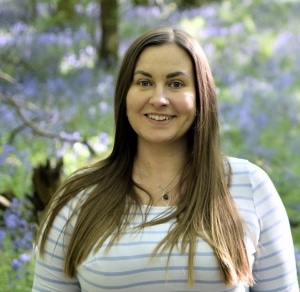Tell us a bit about yourself – what was your PhD about and where did you study?
My PhD, completed in 2017 at the University of Warwick, was in using diamond to make electrochemical sensors for use in extreme environments – making use of the robust nature of diamond as a material. Before that I did my MSc at Warwick in Analytical Science and my undergraduate in Forensic Science at Nottingham Trent University.
What do you do now? What did you decide to do next after gaining your PhD?
After my PhD I was a postdoc for a year, before transitioning into industrial research. I am now a research scientists in the water industry, developing different analytical techniques and sensors to help keep our water systems safe. I love my job. People often think that industrial research jobs aren’t as creative as academic positions, but I get to create and innovate every day!
Has having a PhD helped in developing your career? If yes, what has been the biggest impact? If no, why do you think that is?
Yes – I became a much more independent researcher, and am now capable of leading research projects of my own. I learned a lot of transferrable skills that have really helped me hit the ground running for my industry job, time management, delivery of results under pressure and the importance of collaborative work.
What’s one piece of advice that you’d offer prospective students considering a PhD?
Make sure to set boundaries for yourself to maintain a work/life balance. It is easy for you to feel you have to work all the time, even over weekends. In reality, it is essential we take the time to rest and not burn out so we can be creative. Investment in you and your wellbeing will serve you greatly throughout the course of your PhD. It is a marathon, not a sprint, so you need to conserve your energy.
And what one thing would you suggest that new PhD graduates should do next?
Explore all your options. So often we are only really shown the path to a successful career is in academia, but there are lots of other opportunities out there, be it scicomm, consultancy work, industry, policy etc. By having a PhD you prove that you can learn on the job, so your choice for your career is vast.
Lastly, what’s your favourite memory from your time as a PhD student?
It’s really hard to pick one. I think just the “silly” stuff, like chatting with work colleagues (who are now life long friends), celebrating their successes as well as my own. We always used to go for an icecream, come rain or shine, if someone got a paper published, or if their experiment (finally) worked!
Want to learn more about Zoë?
Follow her on Twitter using the link below:

